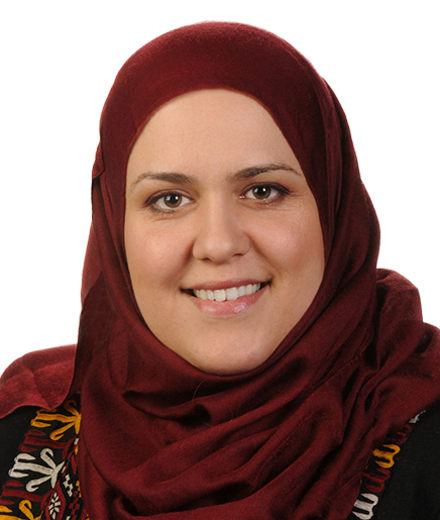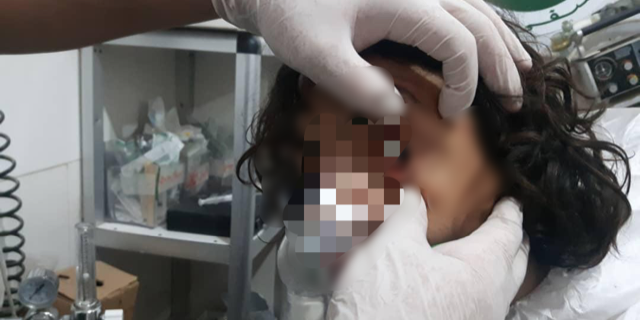
'Amid the traumas of Syria’s war, women like Ghalia Rahal are building an unprecedented role in peace talks over their country’s future. Rahal—the founder of a network of women’s centers in northwest Syria—has helped energize a Syrian women’s movement despite threats from extremists, attacks on her workplaces, and the assassination of her son, a journalist. Syrian women leaders say Rahal is one of many local activists who have enabled women to strengthen their representation in U.N.-backed negotiations for an end to the war. Now, Rahal and her women’s network in in the hilly, fig-growing province of Idlib face an extreme threat—the Syrian government military offensive against the province that has killed hundreds and displaced nearly 200,000 people.
“In Syria, Ghalia is creating a power base for women within a very conservative area,” said Mariam Jalabi, who in 2017 founded a Syrian Women’s Political Movement with Rahal and others. In the rural town of Kafr Nabl, Rahal ran a beauty salon and, amid the war, converted her business into a center to teach women and girls job skills, literacy and first aid. “Women come to her center for a class in sewing, but they discuss what they should do in the community, and they are empowered,” said Jalabi.
Rahal’s work “is part of the foundation for what our national women’s movement has achieved,” including a growing role in the United Nations-supported peace process between Syria’s government and its democratic opposition movement, said Jalabi, who represents the Syrian democratic opposition at U.N. headquarters in New York. The Syrian Women’s Political Movement is pressing for further gains in women’s representation in peace talks and political processes that will define the future Syria.
As a girl, Rahal loved cross-country running through the rocky farmlands and fig orchards of northwestern Syria, and she dreamed of becoming a champion. When she got married, she has said, “I gave up cross-country running because our customs and traditions wouldn’t allow it.” Still, as a mother and housewife, she continued to push the bounds of what society would permit a woman in rural Syria. She opened a hairdressing salon and became a driving instructor.
In 2011, Syrians roseIn Syria as elsewhere, the transformation of political protest into bloodshed marginalized women, Rahal said. “I had a 200-square-meter basement where women used to come for shelter from air strikes by the regime. We would have a lot of women sitting together, sometimes for hours.” Rahal’s crowded bomb shelter became a venue for discussion of women’s roles in a future Syria. “We imagined the situation,” she said. “How would society be if women were not able to overcome many of the woes of war and its aftermath?”
In that basement bomb shelter, Rahal heard stories of women who had lost family members and homes, a daily stream of suffering that changed her focus. “I think I became more caring toward other people, especially girls and women,” she recalled in a 2016 film by Syrian journalist Zaina Erhaim. “Since the war erupted, I felt we all needed one another.”
In 2013, Rahal converted her hair salon into a women’s center to provide women and girls with vital skills such as literacy and job training. The women named it Mazaya, meaning “advantage.”
“We have lectures, vocational training, educational workshops, financial training” and other projects,” Rahal said. Hundreds of women and girls registered for classes—and others volunteered as teachers. A woman skilled in weaving taught her trade. A woman with medical knowledge taught first aid, which “was … necessary because of the many injuries caused by the shelling,” Rahal said. The women obtained a printer and began publishing a magazine to report “the difficulties facing women, news reports [and] humanitarian cases,” she said.
Persuading women to participate in public activities despite traditions that confined them to their homes was difficult, Rahal said. “I had to make them trust and believe in our work, and bear the negative words and harsh criticism.” But with time, “I have seen how women started changing and coming out of the houses to help each other.”
Women’s activism is discouraged in Syria by patriarchal social traditions, by habits bred under decades of oppressive, single-party rule—and by the rise of movements promoting a narrow interpretation of Islamic faith. “Our society did not accept the idea of a women’s center,” Rahal said.
To overcome resistance, Rahal visited Kafr Nabl’s power brokers, who of course were men. “Typically, women do not approach these town elders, the sheikhs, directly. But Ghalia does it,” said Jalabi. “She explains to them that women’s education provides benefits to the whole community. She gives them a sense of co-ownership,” and shows local leaders that cooperation with her project can help them look better in the eyes of their own people. She has been “able to establish with them a social contract in which they protect her centers and her work,” Jalabi said.
One reason for Rahal’s success, Jalabi and others noted, is that she is—and is seen as—a deeply religious person who is drawing her ideas and language for change from her community’s basic religious principles. She wins respect from local leaders on both religious and social bases. “Ghalia has broken down many of the barriers against women with the strength of her personality and the respect she has earned from everyone, including men,” Jalabi said. “She has built a business, she is financially independent, and she is the mother of adult children who are also respected in the community.”
One of the adult children who won respect for Rahal was her oldest son, Khaled al-Issa. He was active in the 2011 uprising, and became a locally prominent photojournalist. With a few colleagues—including one of Syria’s best-known dissidents, Raed Fares, he established a media center, including a radio station, in Kafr Nabl. They reported via news organizations and social media on the brutality of the war and attacks on civilians in northwest Syria.
“My son, Khaled, told me, ‘Mom, you have started digging a road through all the thorns, and you are able to continue on with it. It is a revolution, my mother,’” Rahal recalled.
Apart from the resistance by traditional conservatives, Rahal and her work have faced physical attack by extremists. While Kafr Nabl has seen the growth of a democratically oriented civil society, including its women’s movement, it also has a constituency that favors Islamist groups, including Hayat Tahrir al-Sham (formerly the Nusra Front, affiliated with al-Qaida). In 2014 the Mazaya center was burned in an arson attack. Rahal and her allies rebuilt it. The next year, the Nusra Front attacked Mazaya and Khaled’s radio station. Residents of the town rallied in the streets in protest. In July 2016, Khaled was killed by a bomb planted in the home where he was living in Aleppo.
Today, Mazaya is a network of eight women’s centers, plus five child-care centers, in Kafr Nabl and other towns across southern Idlib. The women’s centers provide nursing and vocational training, job placement and professional development services. The Mazaya organization now produces both a print and an electronic magazine that make the case for education and empowerment for women and girls. Amid new reports of bombing in Idlib, Rahal sent a text message to Jalabi on May 21 that she has had to close some of her centers for fear that they may be struck. Others are continuing to work, located in basements.
“Ghalia has somehow been able to maintain a livelihood, swim against conservative and repressive social norms, survive the government’s relentless violence, and navigate and challenge the rise of armed extremist organizations—all while implementing her vision for a future Syria in which women are safe, empowered and free,” said Jalabi.'



![A civil defence member carries an injured girl following air strikes which hit Idlib, Syria 2 June 2016 [REUTERS/Khalil Ashawi]](https://i1.wp.com/www.middleeastmonitor.com/wp-content/uploads/2019/05/2019-05-16T080453Z_1_LYNXNPEF4F0EV_RTROPTP_4_MIDEAST-CRISIS-SYRIA-e1557995228634.jpg?resize=1200%2C800&quality=75&strip=all&ssl=1)




